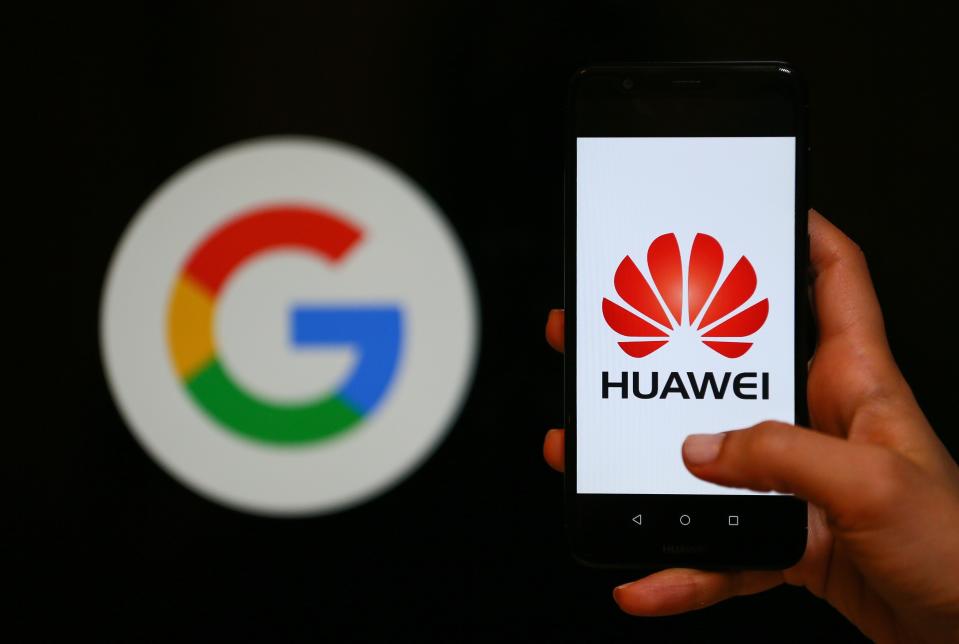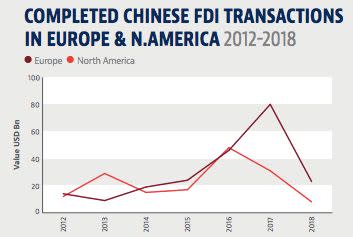How China can hurt the U.S. beyond imposing tariffs
It’s been almost a year since President Donald Trump declared a trade war against China by slapping 25% tariffs on $50 billion worth of Chinese goods, and things are only getting worse. China raised tariffs on tens of billions of dollars of goods imported from the U.S. on Saturday, in retaliation against Trump’s latest round of duty hikes on about $200 billion in Chinese exports.
China’s tit-for-tat tariffs now have covered almost two-thirds of its imports from the U.S. As 11 rounds of trade negotiations ended with deadlocks and the U.S. government cracked down on Chinese telecom giant Huawei, the world’s second-largest economy has vowed to “fight to the end.”
Here is how China could retaliate against the U.S. beyond imposing tariffs.
Stop buying agriculture, planes and energy
Slapping additional tariffs on U.S. goods could hammer the demand for U.S. goods, but China could affect import decisions in an even more powerful way through state purchases and state-owned enterprises.
China has stopped purchasing U.S. supplies in politically sensitive regions, including farms located in swing states like Iowa.

According to U.S. Department of Agriculture data, China bought about 13 million metric tons of American soybeans after the countries agreed to a truce in December, in a move that showed goodwill toward getting the trade dispute resolved, but the orders have reportedly stopped in May. Soybean orders from China have fallen off the cliff by 98% in 2018, and farmers’ income dropped in the first quarter this year — the most in three years. Beijing is hoping to pressure Trump’s electoral base. One farmer in Kansas told Yahoo Finance that his “patience is running thin” despite government aid. Following the collapse of an anticipated trade deal, China also canceled an order for 3,247 metric tons of U.S. pork — the largest cancellation in over a year — according to Reuters.
And it’s not just farmers who are feeling the pain as China uses its wallet to gain leverage. Since 2017, China has become the world’s second-largest liquefied natural gas (LNG) buyer and the world's largest buyer of plastic materials. The country is also airplane manufacturer Boeing’s second-largest client. So, how China spends its money directly affects many U.S. companies’ bottom lines and the livelihood of American workers.
Restrict rare earth exports
Rare earth has become the latest flashpoint in U.S.-China trade tensions, as China’s state-owned media has framed it as a new trump card against the U.S. China’s President Xi Jinping recently highlighted the country’s dominance in rare earth materials, sending signals to the U.S. that it could restrict the export following the U.S. ban on Huawei. China not only owns most of the world’s deposits of the ores for 17 metals widely used in tech products, but it is also home to industrial supply chains that depend on such metals. Despite owning large rare earth reserves, the U.S. relies on China for 80% of its rare earth imports.
It’s not the first time China has used its rare earth reserve to threaten foreign countries. In 2010, China sharply limited rare-earth exports to Japan over a maritime dispute. China’s 25% tariffs already targeted about 50,000 tons of rare earth concentrate extracted every year by MP Materials, which owns the only rare earth mine in the U.S.
Create an ‘unreliable entity list’
China is creating its own blacklist of foreign companies after a similar move by the U.S. On Friday, the Ministry of Commerce announced China plans to place foreign companies that “have damaged the interests of Chinese companies” on an “unreliable entity” list, in response to the U.S. Department of Commerce’s ban of Huawei.
China’s list, which will include companies, organizations and individuals, will target entities deemed to have blockaded Chinese companies from suppliers for non-commercial reasons, or those that are national security threats. The procedures are still opaque, but China says there will be an investigation process and opportunities for stakeholders to defend themselves.

On Saturday, China also opened an investigation into FedEx, after Huawei alleged the delivery company diverted its two Asia-bound packages to the U.S. and rerouted two others. On China’s social media, many speculate U.S. companies like Google and Qualcomm, which cut off supplies to Huawei following the U.S. ban, are also under the risk of being targeted.
Slow foreign direct investment, hit U.S. tourism
Foreign direct investment from China into the U.S. plummeted by 83% in 2018 to the lowest point in seven years, according to Rhodium Group. Meanwhile, the number of Chinese tourists to the U.S. fell 5.7% in 2018 to 2.9 million visitors, the first year-over-year drop since 2003, National Travel and Tourism Office data shows.

The slowdown means the U.S. is losing the capital and consumer spending that have buoyed its market for years. It’s hard to say the reversed trend is simply because China doesn’t want to support the U.S. economy with its money. On one hand, the U.S. has tightened its security on foreign investment through the Committee on Foreign Investment in the United States (CFIUS), which effectively closed the door for Chinese investment on key high-tech areas. Also, with an ongoing deleveraging campaign and a cooling economy in China, its people and capital are more likely to stay close to home.
Unlikely measures, for now
Both China and the U.S. know that in a highly-connected global economy, any measure of protectionism could disrupt the market order and bring unintended consequences.
The following measures, so far, have been mere talking points and are not very likely to be implemented given their high risk of backfiring.
Currency manipulation
Manipulating the currency exchange rate, for example, could protect Chinese exports from additional tariffs, but also risk disrupting the financial market. China’s yuan has devalued 9% since May 2018 in the wake of U.S. tariffs. Beijing has been restrained from implementing currency controls because a weaker yuan is likely to trigger a massive exodus of funds from China, which would bring more financial risk and ruin Beijing’s years-long efforts to set a market-based rate for yuan. But some economists believe this move is still on the table for discussion if the GDP growth is further hammered.
Selling U.S. Treasuries
With $1.2 trillion in hand, China is one of the largest holders of U.S. debt, owning 27.5% of all debt held by foreign countries, according to the U.S. Treasury Department. But weaponizing its Treasury holdings could shoot Beijing in the foot, because it may bring a nosedive in the value of its remaining Treasury. Selling off its U.S. Treasury reserve also risks destabilizing world financial markets and driving interest rates higher. Most people see it as a counterproductive measure for Beijing.
Boycotting American brands
Outside the financial world, the nationalism and anti-American sentiment are also simmering and state-owned media has been playing along. But Beijing will be careful when the sentiment moves from online to real-life behaviors. Last time when anti-Japanese sentiments erupted, the protests turned into riots when people burned Japanese cars, which ran counter to Beijing’s priority of keeping “social stability.”
Since American companies already have a big presence in China, boycotting them would punish its Chinese employees. Apple, for instance, has over 2 million workers in its supply chain, according to Bank of America Merrill Lynch. It’s in Beijing’s best interest to keep the countermeasures in the business community for now instead of stirring up a full-blown anti-American crisis.
Note: The third to the last paragraph has been updated for clarity.
Krystal covers tech and China for Yahoo Finance. Write to Krystal via krystalh@yahoofinance.com or follow her on Twitter.
U.S. is entirely responsible for the 'severe setback' in trade deal: China
Huawei is still winning 5G contracts around the world despite the U.S. ban
Follow Yahoo Finance on Twitter, Facebook, Instagram, Flipboard, SmartNews,LinkedIn, YouTube, and reddit.


